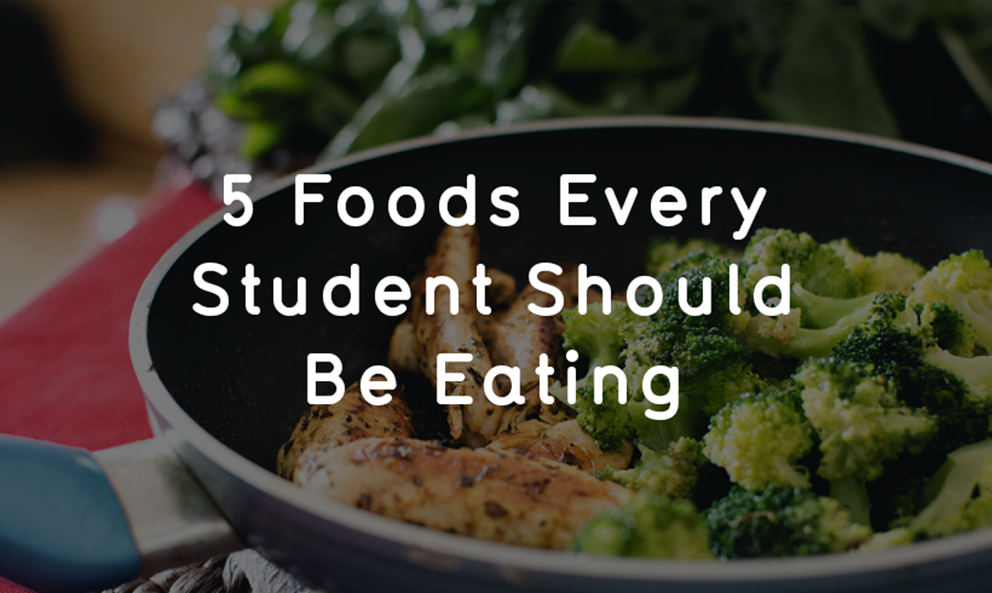5 Foods Every Student Should Be Eating

A big part of eating well as a student is simply resisting the temptation to eat junk food. One of the best ways to do this is to make sure there’s none of it to be found in your kitchen cupboard, and that you’ve always got healthy alternatives on hand for when you want to snack or whip up a quick meal.
Here’s a list of 5 foods that every student should keep stocked up on.
Dark chocolate
You might be surprised to find chocolate on this list, but when the sugar and milk are reduced, it pretty much becomes a healthy superfood. The key is in getting dark chocolate with the highest possible cacao content, as cacao is linked with benefits ranging from improved blood pressure to enhanced mood.[1] For a healthy snack which satisfies your cravings for something sweet, this is the best thing going.
Help yourself to a couple of squares of dark chocolate whenever you need a pick-me-up, or as dessert after a meal.
Bananas
Bananas are the perfect snack – naturally separated into portion sizes, with their protective wrapping, sweet, and easy to mix with other ingredients. A large banana has around 100 calories, meaning that it’s not going to leave you feeling empty. On top of that, bananas are rich in potassium and fibre – both nutrients which might help to reduce stroke risk in men.[2]
Eat these handy fruits on the go as a quick snack, mixed into your breakfast yoghurt or porridge for flavour and extra energy. If you’re feeling creative, mash and freeze them for a healthy ice-cream alternative.
Potatoes
Potatoes are a great base for any meal. They can be boiled and ready to eat in under half an hour when you’re in a rush, or roasted when you’re feeling more like a proper chef. A mere 100g of potato provides around 300 calories in the form of healthy carbs, and one study even found that they contain rare compounds which might help to lower blood pressure. [3]
Even better than your typical British varieties are sweet potatoes. These have even less calories than white potatoes while still managing to be packed full of vitamin B5, B6, thiamin, niacin, riboflavin and your entire daily requirement of Vitamin A in a single potato. They’re fat-free and a great source of slow-release energy, perfect for helping to keep you on the go. What’s more, they’re sweet and delicious; a great way to liven up any dish. [4]
Eat these healthy tubers for breakfast as an omelette, boiled for a quick lunch, or roasted and covered in butter when you’ve got some time to kill.
Eggs
Today, it’s generally accepted by health professionals that the old scares about eggs damaging your heart and all the rest are scientifically unfounded (as long you’re eating high quality, organic eggs, that is).[5]
Instead, eggs are beginning to develop a long-deserved reputation as a superfood. A single large egg contains around 80 calories and an impressive 6 grammes of protein. On top of that, a single large egg contains about 20% of your daily requirement of selenium (an antioxidant which might promote heart health and cognitive function.)[6]
Fry or scramble your eggs for a quick breakfast, or boil them for a nutritional snack on-the-go.
Beans
When you’re after a food that will keep for a long time and be ready to eat within seconds when you need it, it’s hard to do better than a can of beans. Not only are beans one of the most convenient foods to have around, but they also pack a nutritional punch. 100g of baked beans contain about 155 calories, and 6g of protein. 100g of Adzuki beans contain about 350 calories, and about 20g of protein.
On top of that, beans tend to be rich in antioxidants and contain essential nutrients such as iron, magnesium, manganese and potassium.
Eat your beans on toast, by themselves, mixed into a stew, or just keep them in the cupboard for a future lazy day.
Hollie Miles, GM & Nutritionist
[1] http://www.naturalnews.com/041916_cacao_scientific_research_health_benefits.html
[2] https://www.ncbi.nlm.nih.gov/pubmed/9743511
[3] https://www.ncbi.nlm.nih.gov/pubmed/15969534
[4] http://www.livescience.com/46016-sweet-potato-nutrition.html
[5] http://articles.mercola.com/sites/articles/archive/2009/03/10/the-sunny-side-of-eggs.aspx
[6] https://www.ncbi.nlm.nih.gov/pubmed/10382553


